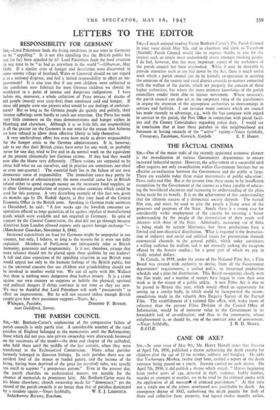LETTERS TO THE EDITOR
RESPONSIBILITY FOR GERMANY
Sta,—Lord Pakenham finds the living conditions in our zone in Germany to be "appalling." Is it not also appalling that the British public has not (so far) been appalled by it? Lord Pakenham finds the food situation in our zone to be "as bad as anywhere in the world "—(Observer, May 11th). If a similar state of hunger and destitution were discovered in some remote village of Scotland, Wales or Cornwall should we not regard it as a national disgrace, and feel a united responsibility to effect an im- provement? It is also true that if our own children were subjected to the conditions now habitual for most German children we should be maddened to a point of intense and dangerous indignation. I have before me, moreover, a whole collection of Press notices of deaths of old people (mostly over sixty-five) from combined cold and hunger. If these old people were our parents what would be our feelings of embitter- ment? But so long as the German people die quietly and politely, their intense sufferings seem hardly to catch our attention. Our Press has made very little comment on the mass demonstrations and hunger strikes in Hamburg and elsewhere. Although it is so little felt, our responsibility is all the greater for the Germans in our zone for the reason that hitherto we have refused to allow them effective liberty to help themselves.
A very unchivalrous effort has even been made to divert responsibility for the hunger crisis to the German administrators. It is, however, safe to say that their British critics have never for one week, or probably never for one day, tried to live and to do normal work on the equivalent of the present abnormally low German rations. If they had they would now allot the blame very differently. (These rations are supposed to be about half what we eat ourselves, and in practice are sometimes one-third or even one-quarter.) The essential fault lies in the failure of our own democratic sense of responsibility. The immediate cause may partly lie in a breakdown of administration; the more essential cause lies in British refusal either to spend enough money on the necessary food supplies, or to allow German production of exports to other countries which could be used for this purpose. A very disturbing example of this fact was given six months ago by Dr. Rudolf Agartz, at that time head of the Central Economic Office in the British zone. Speaking to German trade unionists at Diisseldorf, he said: "A few weeks ago the Swedish consumer co- operatives offered us large quantities of fat against supplies of manufactured goods which were available and not required in Germany. In spite of support by the Control Commission, the deal did not go through because directives from London allowed exports only against foreign exchange "- (Manchester Guardian, November 8, 1946).
Increased expenditure on food for Germans might be unpopular in our country, but only, I believe, so long as the reasons for it were not fully explained. Members of Parliament not infrequently refer to British humanity, generosity and magnanimity. Is it not, therefore, strange that more reliance should not be placed upon these qualities by our leaders? A full and clear exposition of the appalling situation in our British zone would appeal not only to the humane feelings of the British public, but to the universal concern that out children and grandchildren should not be involved in another world war. We can all agree with Mr. Wallace that there is nothing more dangerous than human misery. It is a crime against our own country to suppress or belittle the physical, spiritual and political dangers if things continue in our zone as they are now. We may be thankful that Lord Pakenham will work " passionately " to effect an improvement. But he will not succeed unless enough British people give him their passionate support.—Yqurs, &c.,


































 Previous page
Previous page